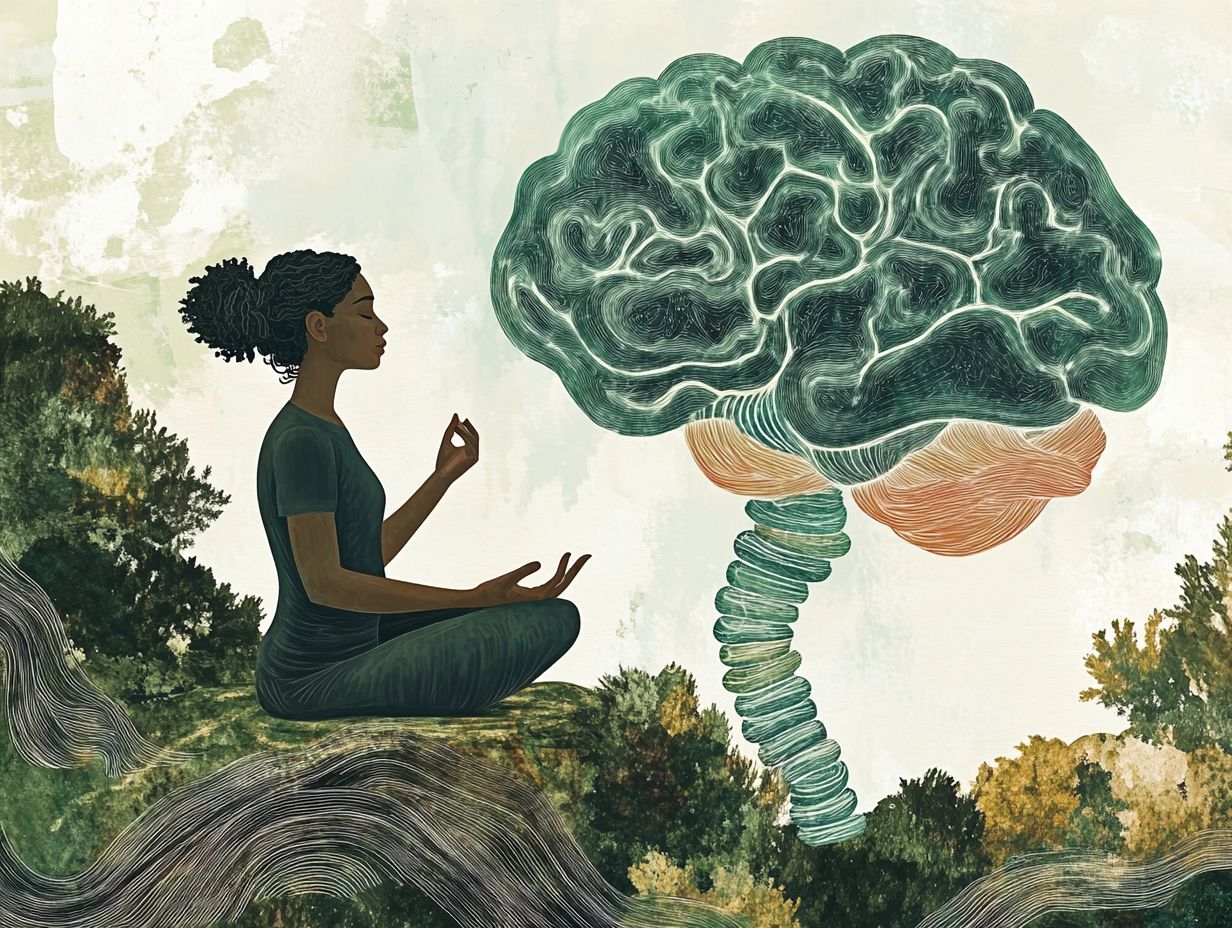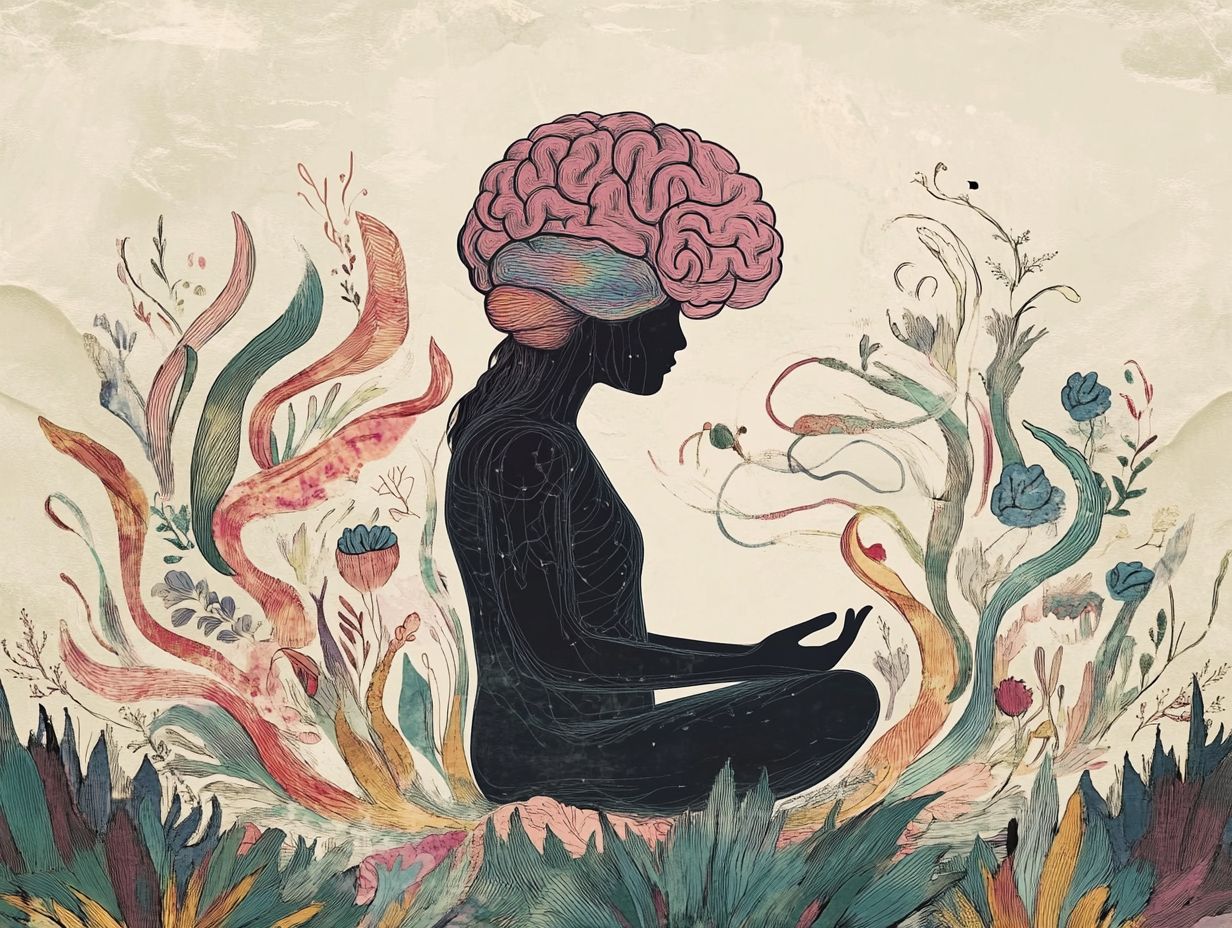Understanding the Gut-Brain Axis and Anxiety
The intricate relationship between your gut and brain is an intriguing subject that has recently captured the spotlight in the realm of mental health.
Emerging research underscores the significant role your gut microbiome various types of bacteria residing in your digestive system plays in influencing anxiety and overall mental well-being.
This article delves into the gut-brain axis, shedding light on how gut bacteria affect your emotions, helping you recognize the signs of anxiety, and exploring effective treatment strategies.
By grasping this connection, you can take proactive steps to manage anxiety through simple yet impactful dietary and lifestyle adjustments.
Contents
- Key Takeaways:
- Unlocking the Gut-Brain Connection
- The Role of the Microbiome in Anxiety
- Signs and Symptoms of Anxiety
- Treating Anxiety through the Gut-Brain Axis
- Preventing Anxiety through Gut Health
- Frequently Asked Questions
- What is the gut-brain axis and how does it relate to anxiety?
- How does stress affect the gut-brain axis and contribute to anxiety?
- Can changes in diet help improve symptoms of anxiety related to the gut-brain axis?
- What role do probiotics play in managing anxiety symptoms related to the gut-brain axis and the central nervous system?
- Are there any other lifestyle changes that can help improve the gut-brain axis and reduce anxiety?
- Can an unhealthy gut-brain axis lead to other mental health issues besides anxiety?
Key Takeaways:

- Connect the gut and brain through the gut-brain axis, a communication system that influences mental health.
- Recognize that an imbalance in the gut microbiome can contribute to anxiety, as gut bacteria produce chemicals in the brain and regulate the immune system.
- Identify signs of anxiety that can show up physically and emotionally, and address gut health through probiotics and lifestyle changes to help alleviate symptoms.
Unlocking the Gut-Brain Connection
The gut-brain axis is a fascinating communication network that links your digestive system with your central nervous system. It highlights the significant impact that gut microbiome health has on your mental well-being and decision-making.
This complex relationship shapes your emotional responses and plays a vital role in various health conditions, including functional gastrointestinal disorders and mental health issues.
With the vagus nerve acting as the main channel for dialogue between your gut and brain, understanding this connection provides valuable insights into gut feelings and their implications for both psychological and physical health.
Explaining the Connection
The gut-brain connection is a fascinating interplay where your gut microbiome communicates with your emotional brain, influencing both your mental health and physiological responses.
This intricate dialogue unfolds through neurotransmitters and hormones produced by gut bacteria, which can significantly sway your mood and stress levels. For example, certain strains of probiotics can enhance serotonin production a vital chemical in the brain that helps regulate happiness.
Your dietary choices play a pivotal role in shaping microbiome diversity. By embracing a diet rich in fiber, fruits, and fermented foods, you cultivate a more diverse and balanced gut environment.
On the flip side, indulging in high-sugar and processed foods can diminish that diversity, potentially leading to increased anxiety and depression. Understanding these mechanisms underscores the vital importance of gut health in nurturing your emotional well-being.
The Role of the Microbiome in Anxiety
The gut microbiome holds a crucial influence over anxiety disorders, shaping your ability to manage stress and regulate emotions. This connection operates through the gut-brain axis, where it modulates the production of neurotransmitters and maintains hormonal balance, ultimately affecting your mental well-being.
How Gut Bacteria Affects Mental Health

Gut bacteria have a profound impact on mental health, influencing your decision-making processes and emotional responses through the production of various neurotransmitters.
These microorganisms are pivotal in synthesizing essential chemicals like serotonin and gamma-aminobutyric acid (GABA), both crucial for regulating mood and anxiety levels. A more diverse gut microbiome is linked to heightened emotional resilience and cognitive function, indicating that variations in gut bacteria could result in different mental health outcomes.
Research underscores the significance of maintaining a diet rich in whole foods and probiotics. By doing so, you can encourage the growth of beneficial gut bacteria, which supports overall brain health and enhances emotional stability.
Signs and Symptoms of Anxiety
Anxiety reveals itself through a multitude of signs and symptoms. You may experience physical sensations, such as a gut-wrenching feeling, alongside emotional responses like excessive worry and persistent tension.
Physical and Emotional Indicators
Physical and emotional signs of anxiety can manifest in various ways, such as an increased heart rate and digestive disturbances. You may also notice that nagging gut feeling that often comes with stress.
Understanding the connection between your mind and body is crucial. Anxiety can cause physical reactions, leading to discomforts like bloating, nausea, or even more serious gastrointestinal issues.
By recognizing these signs, you can tap into the link between your gut and brain, where the brain s stress signals can disrupt digestive function. Addressing both the emotional and physical symptoms is crucial for effectively managing anxiety. This calls for a holistic approach that considers not just your mind but also your body s responses.
Treating Anxiety through the Gut-Brain Axis
Addressing anxiety through the gut-brain axis requires a comprehensive approach. This may encompass incorporating probiotics, making thoughtful dietary adjustments, and integrating mindfulness practices all designed to enhance both gut health and emotional well-being.
Probiotics and Other Strategies

Probiotics and a range of complementary strategies are emerging as compelling treatments for anxiety, underscoring the crucial connection between gut health and emotional well-being.
Research indicates that a diverse gut microbiome significantly impacts mental health. Neurotransmitters, like serotonin, help regulate mood, and a healthy microbiome influences their production. By incorporating probiotics into your daily routine, you can support this diversity and potentially alleviate anxiety symptoms.
Making dietary changes can also help. Boosting your fiber intake and cutting back on processed foods can enhance your gut health. Lifestyle adjustments, such as engaging in regular exercise and practicing mindfulness, also play a vital role in creating a holistic approach to mental well-being.
Exploring therapeutic methods like cognitive behavioral therapy (CBT) can amplify these benefits, offering a comprehensive strategy for effectively managing anxiety.
Preventing Anxiety through Gut Health
Take charge today! Start adopting a proactive approach that focuses on cultivating a balanced diet, implementing lifestyle changes, and nurturing a diverse gut microbiome. This multifaceted strategy promotes well-being and gives you the power to take charge of your mental health.
Diet and Lifestyle Changes
Adopting a healthy diet and embracing lifestyle changes are crucial for your gut health and can significantly aid in preventing anxiety.
To nurture a thriving gut microbiome, it s essential to increase your fiber intake by indulging in a diverse array of fruits, vegetables, and whole grains. These foods serve as perfect nourishment for your beneficial bacteria.
Adding fermented foods like yogurt, kimchi, and sauerkraut to your diet can introduce probiotics that enhance gut diversity.
When you combine this with regular exercise which not only promotes physical well-being but also lifts your mood along with mindfulness practices to help reduce stress, you create a powerful synergy.
Together, these dietary and lifestyle adjustments foster a balanced gut environment, playing a pivotal role in emotional regulation and overall wellness. This holistic approach can make you feel more resilient against anxiety and gives you the power to thrive.
Frequently Asked Questions
What is the gut-brain axis and how does it relate to anxiety?

The gut-brain axis is the ongoing communication between your brain and gut. This connection helps regulate mood and emotions.
When there is an imbalance in the gut-brain axis, it can lead to an increase in anxiety symptoms.
How does stress affect the gut-brain axis and contribute to anxiety?
Stress directly affects the gut-brain axis. It disrupts the balance of good and bad bacteria in your gut.
This disruption can lead to inflammation and changes in neurotransmitter levels, causing an increase in anxiety symptoms.
Yes, changing your diet can help. Reducing processed foods while adding fiber and fermented foods can boost gut health and lessen anxiety.
A healthy gut microbiome can positively influence the gut-brain axis and overall mental health.
Probiotics are live bacteria that help maintain a healthy gut. They can reduce inflammation and regulate neurotransmitters, which may lower anxiety.
However, it is important to consult with a healthcare professional, such as those at the Cleveland Clinic, before starting any probiotic regimen.
Are there any other lifestyle changes that can help improve the gut-brain axis and reduce anxiety?
Besides a healthy diet, managing stress is key. Regular exercise, mindfulness, meditation, and quality sleep can greatly improve the gut-brain axis and reduce anxiety.
It’s important to find a balance of healthy habits that work best for each individual.
Can an unhealthy gut-brain axis lead to other mental health issues besides anxiety?
Yes, an unhealthy gut-brain axis can contribute to other mental health issues. Conditions like depression, ADHD, and even autism have been linked to this imbalance.
By improving gut health and promoting a diverse gut microbiome, these conditions may also see improvement.






